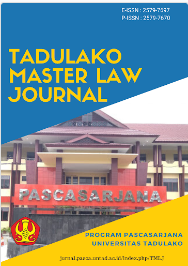KEBIJAKAN HUKUM PIDANA DALAM PENANGGULANGAN TERORISME DI INDONESIA
Keywords:
legal policy, Terrorism , IndonesiaAbstract
Agus Tri Saputra D 102 18 039 criminal law policy in overcoming terrorism in Indonesia supervised by Benny Diktus Yusman and Hamdan Rampadio Formulating the problem of how to criminal law policy in overcoming criminal acts of terrorism in Indonesia. What are the obstacles and factors faced in overcoming criminal terrorism in Indonesia. Using normative juridical methods Referring to Seorjono Soekanto's typology, he explained that the study of approaches to normative law versus normative ones conceptualizes law as norms, rules, regulations and legislation that apply at a certain time and place as the product of a particular sovereign state power. The crime of terrorism is a form of cross-border crime that seriously threatens world order and peace. Terrorism is a crime that cannot be classified as an ordinary crime. Academically, terrorism is categorized as an "extraordinary crime" and is also categorized as a "crime against humanity". The criminal act of terrorism is defined as a serious human rights violation which was first discussed in the European Convention on the Suppression. of Terrorism (ECST) in Europe in 1977 which adhered to the concept of expanding the meaning paradigm from Crimes Against the State to Crimes Against Humanity. Crimes Against Humanity include criminal acts intended to create a situation that results in individuals, groups and the general public being in an atmosphere of terror. In relation to human rights, crimes against humanity fall into the category of gross violations of human rights which are carried out as part of widespread or systematic attacks that are known to be directed directly at civilians, more so at the lives of innocent people (public by innocent).






